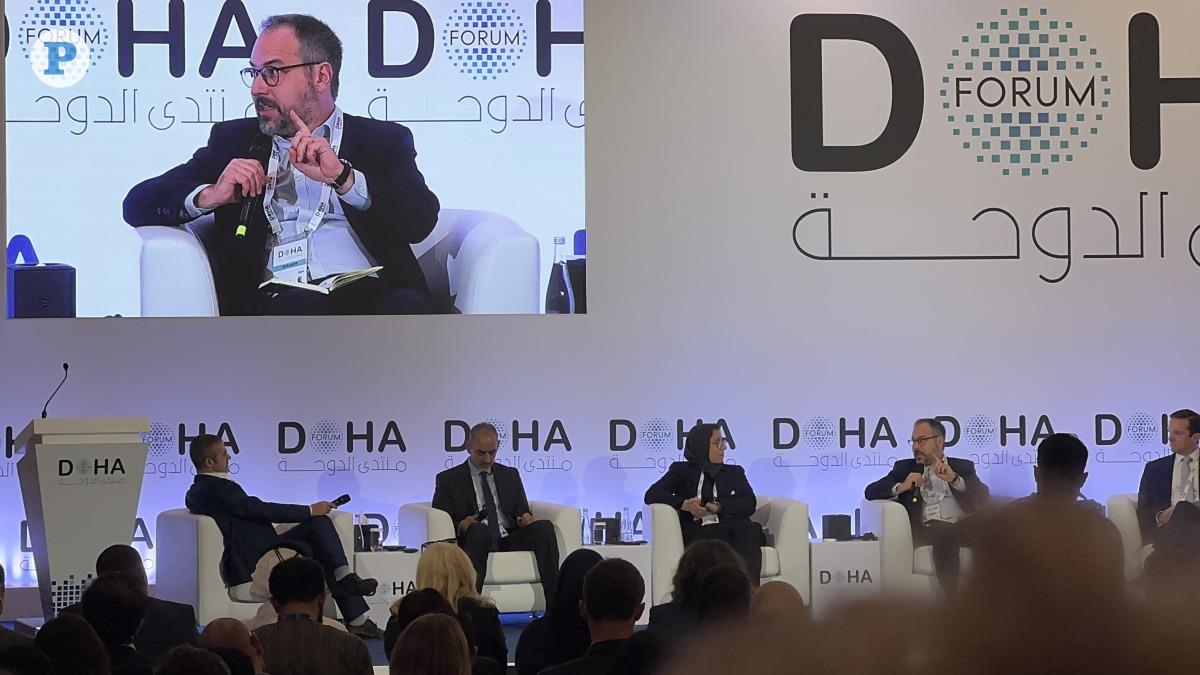
Arab Public Opinion Shows Profound Shift Following Gaza War, Doha Forum Speakers Reveal
Doha, Qatar: Nationally representative surveys show that here has been a dramatic change in regional perspectives in the aftermath of October 7, 2023, with a growing disconnect seen between Arab public opinion and Western institutions. This was revealed at a Doha Forum session titled "Shifting Arab Public Opinion and the Gaza War" that was held at Sheraton Grand hotel.
Co-hosted by the Middle East Council on Global Affairs and Arab Barometer, the session brought distinguished speakers: Dr. Tarik Yousef, Director of the Middle East Council on Global Affairs, Dr. Amaney Jamal from Princeton University, Dr. Michael Robbins of Arab Barometer, and Nadim Houry of the Arab Reform Initiative, with Los Angeles Times Middle East Bureau Chief Nabih Bulos moderating the discussion.
The speakers discussed data from the surveys showing how widespread support for the Palestinian cause has led Arab nations to reconsider normalization with Israel.
Through Arab Barometer's unique dataset, the speakers examined how these significant shifts in public sentiment could reshape regional dynamics, international relations, and prospects for resolving the Palestinian-Israeli conflict, while highlighting a growing disconnect between Arab public opinion and Western institutions.
The dialogue challenged several prevailing Western narratives about regional attitudes.
It conveyed interesting statistics about Hamas public support inside of Gaza, noting that approximately two-thirds of Palestinians in Gaza were distrustful of the Hamas government prior to October 6, 2023.
The emphasis was also drawn that 50% of Gaza's population was born after Hamas's 2006 election, providing important context to assumptions about universal support for the organization in the territory.
A striking disparity emerged in the discussion of international responses to global conflicts.
The speakers noted that Western sympathy and support for Ukraine significantly "dwarfed" reactions to other regional conflicts, contributing to increasing skepticism among Arab populations regarding Western claims of universal values and human rights principles.
Perhaps most notably, the session highlighted a profound shift among Western-educated Arab elites.
Dr. Tarik's powerful statement, "I spent all my life building bridges, hoping to be part of a world that adheres to rules-based order where Arabs are respected and treated equally as others. I'm walking away from that," encapsulated what was described as "the biggest casualty" of recent events.
He later adds,“we have been in the trenches for a long time, and we are still standing, but we're also tired. We are exhausted.”
The speakers also commented on new forms of political expression among younger generations.
In Jordan, for instance, youth activism has manifested through boycotts of Western products like Coca-Cola.
While some might dismiss these actions as "shallow," Nabih Bulos, Los Angeles Times Middle East Bureau Chief and moderator of the session, interpreted them as significant political expressions from a TikTok-savvy generation being mobilized around the Palestinian cause.
He offered a cautionary note with his "Beware of still waters" observation, explaining that the absence of visible street protests in some Arab countries shouldn't be misinterpreted as acquiescence.
In countries where activists face immediate detention for public demonstrations, political discourse continues through private conversations and alternative forms of expression.
The discussion challenged stereotypical depictions of Arab populations, particularly criticizing the tendency to view Arab societies as "angry masses" rather than individuals.
The speakers specifically addressed the problematic categorization of victims in Gaza, noting how Arab men are often excluded from sympathetic coverage and unfairly portrayed as "potential terrorists until proven innocent."
Looking toward the future, the speakers emphasized that current shifts in public opinion could have lasting generational implications.
While many Arabs, particularly among the educated elite, are questioning their traditional orientations toward Western institutions and education, the alternatives remain unclear.
The session concluded with a strong call for better understanding of Arab societies and the need to avoid harmful stereotypes that have historically justified repressive policies.
The speakers emphasized that rebuilding trust would require acknowledging past failures and developing new frameworks for international cooperation based on genuine equality and respect.

Legal Disclaimer:
MENAFN provides the
information “as is” without warranty of any kind. We do not accept
any responsibility or liability for the accuracy, content, images,
videos, licenses, completeness, legality, or reliability of the information
contained in this article. If you have any complaints or copyright
issues related to this article, kindly contact the provider above.


















Comments
No comment